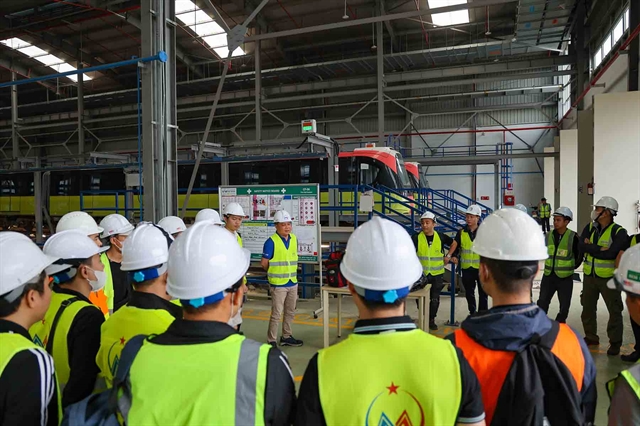 Society
Society

 |
| Training workers for the Nhổn–Hà Nội Station urban railway project. Photo: baochinhphu.vn |
HÀ NỘI — As Việt Nam moves closer to launching major high-speed rail projects such as the North-South express railway and key urban rail lines, preparing a high-quality workforce has become an urgent national priority.
The readiness of workers for all critical positions will determine the country’s ability to absorb technology transfer and master modern railway systems.
According to calculations by the Việt Nam Railway Authority, between 2025 and 2030, the railway sector will require about 338,000 workers. In the immediate term, around 9,200 project management personnel and nearly 13,000 project consultancy staff will be needed.
For the construction phase of high-speed rail alone, labour demand could reach between 70,000 and 80,000 people, including thousands of engineers, project managers and consultants. Once operations begin, an additional 20,000 highly skilled workers will be required.
In response to this challenge, Việt Nam Railways Corporation (VNR) has proactively developed a comprehensive training plan. This includes upgrading the skills of its existing workforce and providing new training aligned with international standards. VNR has partnered with the Liuzhou Railway Vocational Technical College in China and is pursuing similar agreements with institutions in Japan, South Korea and leading domestic universities.
“A highly qualified workforce, proficient in modern technology and techniques, is crucial for the construction and operation of a high-speed rail system. We must prioritise fast, in-depth and high-quality training to ensure sufficient personnel in both quantity and expertise,” VNR leadership said.
On June 10, the Railway College under VNR launched its first training programme focused on high-speed rail. The programme welcomed 200 workers and technicians from VNR’s maintenance units. The course includes two phases: three or four months of theoretical training in Việt Nam, followed by three months of hands-on practice at modern construction sites in China.
Rector of the Railway College Trương Trọng Vương stressed the urgency of the situation, saying: “Preparing existing workers and meeting the demand for personnel during both the construction and operation of high-speed rail is absolutely essential. Beyond our current two specialities, we will soon roll out training for train drivers and dispatchers.”
Government agencies are also taking action. Lê Thắng, Director of Project Management Unit No 2, said his unit had been sending staff for training on construction techniques and project management, so they would be ready to contribute effectively as soon as these major projects begin.
The private sector is equally focused. Đèo Cả Group has developed a detailed personnel strategy for high-speed rail, working closely with domestic and international training institutions.
The company has sent engineers and technicians to China to study tunnel construction technology using tunnel boring machines (TBM). A key feature of this training is direct instruction from top Chinese experts in underground construction, along with practical experience operating TBM equipment at major projects in China.
Nearly 30 engineers and workers will complete this specialised programme by July, and will be ready to contribute to Việt Nam’s high-speed rail ambitions.
Đèo Cả has also imported production lines for rail sleepers and tracks, and is building factories to meet the strict technical requirements of the North-South high-speed rail project.
“We are confident that we can become a core contractor when the project is implemented,” said Nguyễn Tấn Đông, Vice Chairman of Đèo Cả Group’s Board of Directors.
Similarly, Phương Thành Transport Construction and Investment JSC has identified and trained engineers and workers in Europe, Japan and China to prepare for the opportunities these projects will bring. “We have developed a highly skilled workforce and concrete plans so we can take on assigned tasks when the time comes,” said Chairman Phạm Văn Khôi.
To ensure a coordinated workforce development effort, the Ministry of Construction is finalising a master plan for railway workers through 2030. The plan includes over VNĐ40.5 trillion (about US$1.6 billion) for training and upskilling, along with various supporting policies. It requires that all companies tasked with these projects proactively develop a workforce capable of handling key positions, absorbing technology and mastering modern techniques. — VNS




